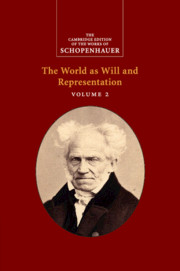Chapter 20 - Objectivation of the Will in the Animal Organism
Published online by Cambridge University Press: 30 June 2022
Summary
By objectivation I mean self-presentation in the real world of bodies. In addition, as I have shown in detail in the First Book and its supplements, this is itself thoroughly conditioned by the cognitive subject, which is to say the intellect, and is thus absolutely unthinkable outside its cognition: for it is in the first instance only intuitive representation and, as such, a phenomenon of the brain. After it has been eliminated, what remains is the thing in itself. The fact that this is the will is the theme of the Second Book, where it is first established in the human and animal organism.
Cognition of the external world can also be referred to as consciousness of other things, in contrast to self-consciousness. After having found within selfconsciousness that the will is the true object ormaterial of self-consciousness, we will now, with the same intention, take into account consciousness of other things and hence objective cognition. My present thesis then is this: what in self-consciousness, and thus subjectively, is the intellect, is presented in consciousness of other things, and thus objectively, as the brain: and what in selfconsciousness, and thus subjectively, is the will, is presented in consciousness of other things, and thus objectively, as the entire organism.
I now add the following supplements and clarifications to the proofs of this claim as presented both in our Second Book as well as in the first two chapters of the essay On Will in Nature.
Most of what is needed to establish the first part of this thesis was presented in the previous chapter, since the necessity of sleep, alterations due to age, and the distinctions between anatomical formations all prove that the intellect, being secondary in nature, is completely dependent on a single organ, the brain, whose function it is, just as grasping is the function of the hand; and that the intellect is therefore physical like digestion, not metaphysical like the will. Just as good digestion requires a strong and healthy stomach, and athletic prowess requires strong and muscular arms, extraordinary intelligence requires an unusually developed, supremely well-constructed brain that is marked by a fine texture and animated by an energetic pulse.
- Type
- Chapter
- Information
- Schopenhauer: The World as Will and Representation , pp. 258 - 281Publisher: Cambridge University PressPrint publication year: 2018



